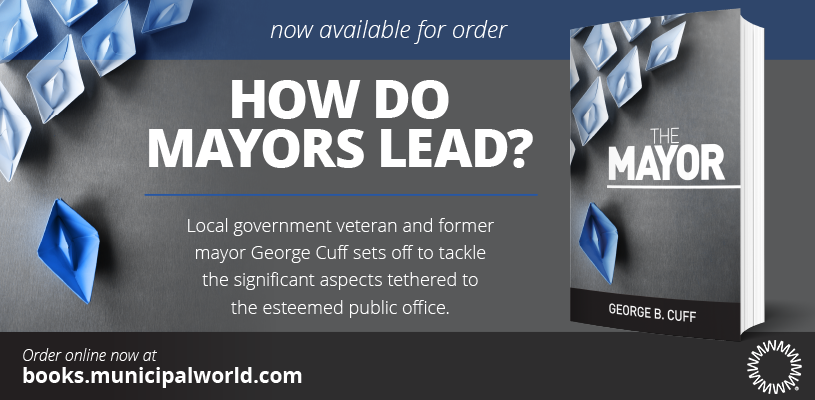Manage your energy at work

In last month’s issue of Municipal World, we took the results of the Juice Check survey and introduced the five elements that help people stay engaged at work. This is the last of four articles focusing on energy in local government.
This article will show you:
- A framework other municipalities are using to engage in energy conversations.
- How to use it to sustain energy and remove depletion.
The Framework is actually an Operating System
Ever experience the blue screen of death?
I was working on a vital document and hadn’t saved it recently. I hit a key and suddenly the blue screen of death appeared. Choice words happened – words my mother would not approve of.
Question: When the blue screen of death shows up on your screen, what just shut down: your applications or your operating system (O/S)?
Answer: It’s your operating system. Your applications are still running in the background, but you can’t access them or interact with them because your O/S is flummoxed.
Your organization has an O/S. It is conversation.
Conversation is the O/S that drives all of your apps. Customer service is an app. Coaching is an app. Innovation, problem-solving, recognition programs – they’re all apps.
Imagine trying to make the customer service app work without conversation. Customer service without conversation is impossible.
For years we’ve worked with municipalities to upload this simple O/S. People have achieved results using it in many situations:
- getting a volunteer unstuck;
- helping a teenager make better choices; and
- in myriad ways at work.
The Conversational Operating System
Let’s say your job is to recruit and manage volunteers. You have a highly valued, very successful volunteer whose name is Dolores. Dolores is 76, and she’s come to tell you she’s quitting.
She loves the work, but she feels her team is belittling her. Your inner impulse is instant: “Rescue Dolores!!” Everything within you wants to sympathize with her, validate her great contribution, and encourage her to stick with it. But, you don’t do that. Instead, you do three vital things with her (not for her or to her). Together, you connect on what matters most, understand what’s possible, and partner for progress.
1. Connect on what matters most:
You get what matters most to each other.
You understand why it matters.
You prove you get it.
2. Understand what’s possible:
You see what’s possible in Dolores’s world.
You share what’s possible in yours.
You find the space of common conviction.
3. Partner for progress:
You chunk down the challenge.
You co-create a solution.
You agree on who owns what.
Reducing depletion and releasing energy
As you draw out what matters most to Dolores, she confides that, in her twilight years, she struggles to feel useful.
You’re curious, and you say, “I can understand why that would be important to me, but I’d love to hear why that’s important for you.”
She says, “Sometimes I wonder if I’m really making a difference. When I get to the end, I want to know my life actually mattered.”
You’ve listened. Now you simply prove that you get it: “Sounds like we both want the same thing here: for you to contribute to a good cause and feel valued for that. Is that it?”
“That is exactly it,” confirms Dolores.
Then you work together to understand what’s possible in this situation. “Have there been times when you did feel valued by your team?”
Dolores says yes, and as she describes those times, you notice her demeanor shift. You suspect she’s regaining some perspective when she says, “Maybe my situation’s not hopeless, I just don’t know what to do.”
You simply ask, “Would you like my help?”
“I actually would.”
So you partner with Dolores to chunk down the challenge and co-create the next steps to help her get what she needs from the team. Finally, you agree on what each of you will own. “Sounds like you’re going to have a conversation with your team leader, and I’m committing to check in with you to see how that went. Is that right?”
“That’s it.”
As Dolores stands up, you can see there is less depletion and more energy inside of her.
Shifting the Energy at Work
Take a look at April’s Juice Check results. Every score is an opportunity to have a conversation with your co-workers. Every score is an opportunity to reduce depletion and release energy in big and small ways.
As you engage in these conversations, your first job is to draw out what matters most to your colleague.
For example, the Juice Check revealed that 45 percent of respondents don’t feel they’re getting the information they need. That item may or may not be an issue for the person you work with. But, if it is, what is it about the lack of information that matters most to them? Are they not getting it on time? Is it not accurate or comprehensive enough? Or are they getting reams of information but lacking context?
As another example, we learned that 32 percent of municipal workers don’t feel recognized for their contribution. So, should your organization purchase an expensive reward and recognition system?
Maybe, but I doubt it.
Instead, draw out what matters most to people when it comes to recognition. Do they want more pizza parties? One person might, but another might want a hand-written thank you note. Another might want to be taken out for coffee and told how much their contribution is impacting customer experience.
I guarantee you there will be four or five aspects of the Juice Check that matter to one of your co-workers. But there is only ever one thing that matters most in a person’s unique, lived experience at work. If you want to reduce depletion and release energy, become skillful at connecting on what matters most.
Connect on what matters most.
Understand what’s possible.
Partner for progress.
Do it.
It’s time to release energy at work.
Below is a brief outline on each article:
March – Even super-stars lose their smarts if they get depleted.
April – The Juice Check points to areas that are depleting people.
May – Depleted people end up acting out – which robs everyone’s energy.
Brady Wilson has a vision: organizations that pulsate with innovative energy. As the Founder of Juice Inc., he functions as a human energy architect, working with leaders to build the conditions in which innovation, value creation, and unforgettable customer experiences can flourish. He helps leaders step into life’s grittiest tensions, inspiring them to create a sustained approach to positive change – and better business results.
as published in Municipal World, June 2018



